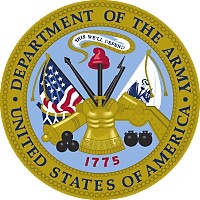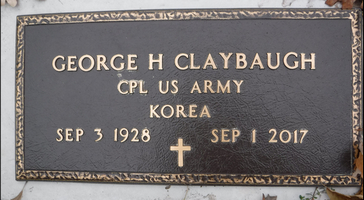Skip to content
George "Buster" Harvey Claybaugh
Lilah Crowe2020-10-11T11:12:59-05:00
- Name: George "Buster" Harvey Claybaugh
- Location of Birth: Pacific Grove, Monterey County, California
- Date of Birth: September 3, 1928
- Date of Death: September 1, 2017 (88 years old)
- Parents: Ralph W. Claybaugh and Lola Marie (Siggelkow) Claybaugh
- High School and Class:
- College:
- Highest Rank: CPL (Corporal)
- Branch: Army
- Other Branch:
- Date Sworn In:
- Place Sworn In:
- Date of Discharge:
- Place of Discharge:
-
- Military Awards:
Korean Service Medal with 2 Battle Stars
Merit Citation
- Military Highlights:
George served in the United States Army from 1951 to 1953 doing a 13-month tour of duty in Korea.
News article from Grand Rapids Herald Review, dated July 27, 2003:
"George "Buster" Claybaugh sits on a truck tailgate holding a thin piece of parchment paper in his hand. It is his original separation of service paper from the American Army in 1953. It is a 50-year-old reminder of his 13 months of service in the Army during the Korean War.
Bob Brockway, who earned a purple heart medal, a Korean Service Metal with three Bronze Service Stars, and a Combat Infantry Badge has a manila envelope filled with other military medals he earned by fighting in Korea, some he has never shown to anyone before.
These two men, from the Grand Rapids area are among some of the 6.8 million men and women who served in the Armed Forces during the Korean War period or what has became known as "The Forgotten War."
From 1950 to 1953 a bloody battle raged in Korea. Sunday, July 27, marks the 50th anniversary of the signing of the armistice agreement between North and South Korean. The United States became involved in the war, the first war in which the newly formed United Nations played a military role, in order to defend the democratic South Korea from communist North Korea.
North Korea invaded South Korea in June of 1950 and what followed is what textbooks refer to as one of the bloodiest wars in history. Bob Brockway is among the soldiers who shed blood during what was simply referred to as a policing "action" or "conflict" for years. U.S. military statistics report that a total of 36,500 deaths took place in the Korean theater in three years. In the Vietnam War a total of 58,202 deaths took place in 10 years.
Brockway, now 71, volunteered to go to Korea when he was 18-years-old.
"I wanted to be a part of the action," he said. "I wanted to do something for my country."
Upon arriving in Korea after an 18-day boat ride across the ocean with 5,000 other troops, his first impression was not what he had expected.
"It was worse..." he said. "It was a wild experience."
The conditions were poor; Brockway described the environment as cold, stinky and rotten. After only two weeks in the country he was hit by shrapnel when heavy artillery hit a bunker he and other soldiers were hiding in. The bunker caved in on the men who were eventually dug out. Brockway went into the hospital for a few weeks, but was later sent to the front lines again.
During close hand-to-hand combat Brockway was injured again, this time by mortar fire.
"I still have flashbacks," he said. "And I probably always will for the rest of my life."
Despite the injuries to his back, arms and legs, and the tough conditions he endured, Brockway who ended his service as a corporal said, "I had a good military experience."
After his injuries Brockway was sent to serve as a prison guard of Korean prisoners of war. He later served in Germany before ending his military career and coming home to eventually become a logger.
"I thought that I had done enough." he said.
While Brockway volunteered for action, Claybaugh, now 75, was drafted into the Army in 1951 at 21-years-old.
The soldier, whose father was in the Spanish War and World War I said, "I felt it was what I had to do."
He was sent to signal school in Japan and later helped install communication lines including telephone lines for M.A.S.H. (Mobile Army Surgical Hospital).
Claybaugh, who retired a corporal remained in Korea for 13 months, says it was nothing like the fun loving characters on the long running television show M.A.S.H.
"It was tough going," said Claybaugh who also came back to the United States and became a logger, something he still does on his family property today.
Typed on his discharge paper it says that Claybaugh's unit received the Korean Service Medal with two battle stars. His unit received a merit citation but Claybaugh says he tries not to think much about the experience in Korea.
He didn't even tell anyone that he was ever in Korea until almost 20 years after he was back from the war. But most people probably never thought to ask. When Brockway and Claybaugh returned to the United States after Korea, a war in which no side could claim victory, hardly anyone knew that the United States was ever involved in fighting in Korea. Even now Claybaugh and Brockway, who were actually friends as children, only mention Korea once in a while to each other.
Today 37,000 soldiers are still based in Korea.
Although many may still chose not to remember "The Forgotten War," some may take a moment on July 27 to remember those who fought and served through violence and valor to help preserve democracy around the globe half a century ago."
- Wars Involved:
Korean Conflict
- MIA / POW:
- Civilian Life:
1956 Census: Marriage of George H. Claybaugh and Alice S. (Remmington) Rancourt on June 2, 1956 in Itasca County, Minnesota.
George was self-employed as a logger on his return to Hill City, Minnesota.
He was an active member of the American Legion Post 340, the VFW, and the Itasca County Farm Bureau.
Preceding him in death are his parents; brother, Ralph; and wife, Alice.
George is survived by his sister, Martha Wilde; children, Patricia Carignan, William (Joann) Rancourt, and Robin (Randy) Brassfield; grandchildren; great-grandchildren; great great-grandchildren; and many nieces and nephews.
George died at the Veterans' Home in LaSalle, Illinois.
Buried in Itasca Calvary Cemetery at Grand Rapids, Minnesota. (Plot C-B-45-16)
- Tribal Affiliation(s):
Page load link


